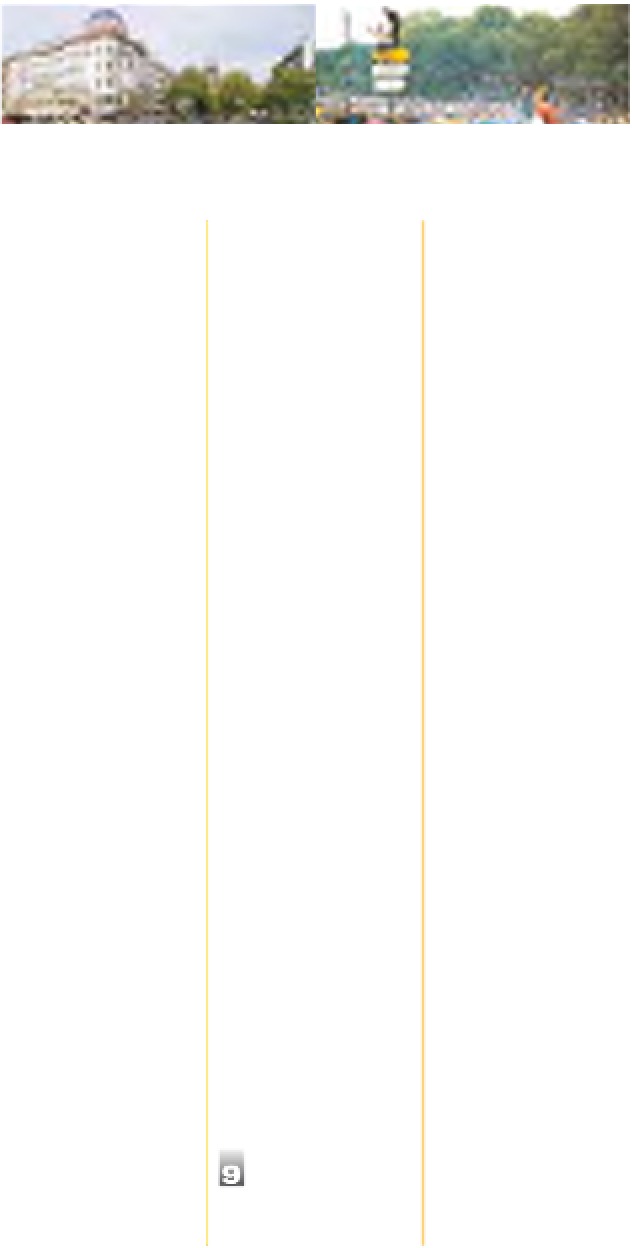Travel Reference
In-Depth Information
Left
In Kurfürstendamm
Right
The Love Parade in July
Planning your Trip
When to Go and
Climate
The weather in Berlin is
better than its reputation.
The continental climate,
which characterizes the
entire region, guarantees
mild and dry weather for
the main holiday period
from May to September.
In spring and autumn it
can be cold and wet, and
it may be advisable not to
travel to Berlin between
November and February,
when it is often cloudy,
and a bitingly cold,
easterly wind whistles
through the city.
Insurance
All travellers are well
advised to buy insurance
cover for accidents, ill-
ness and theft. Cancel-
lation insurance may also
be worth taking out.
for family reductions.
It can be a lot of fun to
explore the city together
with children, but you are
advised to avoid the rush
hours on U-Bahn and
buses, especially if you
are travelling with babies
or very young children.
Driving Licence
UK, US, Canadian
and Australian driving
licences are recognized
in Germany.
Pupils and
Students
Many museums, theatres
and other cultural estab-
lishments offer up to 50
per cent reductions for
pupils and students on
production of a valid
student card.
Visa and Customs
All visitors to Berlin
need valid passports. If
you're staying in Berlin
for 90 days or less, you
will not normally need a
visa. Ask your German
Embassy for details.
Non-EU citizens may
import 200 cigarettes
and one litre of spirits
per adult.
What to Wear
In the summer
months you'll need only
lightweight clothing. In
spring and autumn you
should definitely pack a
rain- and windproof jacket
as well as an umbrella.
Locals dress informally
and more flamboyantly
than other German
urbanites - anything you
like goes. The capital has,
however, gone more
upmarket and you may
feel out of place in many
restaurants or theatres
without a jacket and tie
or evening dress.
Embassies
Australian Embassy
Wallstr. 76-79
•
Map
L4
•
(030) 880 08 80
British Embassy
Wilhelmstr. 70-71
•
Map K3
•
(030) 20 45 70
Canadian Embassy
Friedrichstr. 95
•
Map L4
•
(030) 20 31 20
New Zealand
Embassy
Friedrichstr. 60
•
Map L4
•
(030) 20 62 10
South African
Embassy
Tiergartenstr. 18
•
Map L4
•
(030) 22 07 30
US Embassy
Clayallee 170
•
Map K3
•
(030) 832 92 33
Electrical
Appliances
The electric current is
220 volt; but remember
to bring an adaptor with
two round pins.
Time Difference
Berlin is in the
Central European time
zone, which means that
it is one hour ahead of
Greenwich Mean Time,
six hours ahead of US
Eastern Standard Time
and 11 hours behind
Australian Eastern
Standard Time.
Money
If you're arriving from
abroad, you'll be able to
buy euros at all banks
and bureaux de change
(many are based around
Bahnhof Zoo). Credit
cards, traveller's cheques
and EC-cards are accep-
ted everywhere in the
centre of town.
Children's Needs
If you are travelling
with children, book into
child-friendly accommo-
dation. Always look out
Online map of Berlin:
www.stadtplandienst.de
160















